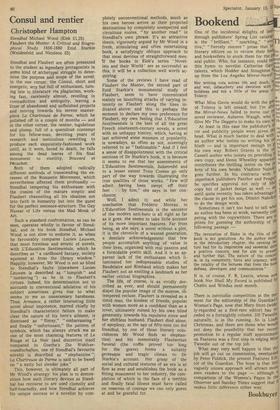Consul and rentier
Christopher Hampton
Stendhal Michael Wood (Elek £1.25) Flaubert the Master: A Critical and Biographical Study 1856-1880 Enid Starkie (Weidenfeld and Nicolson e5) Stendhal and Flaubert are often presented to the student as legendary protagonists in some kind of archetypal struggle to determine the purpose and scope of the novel: in the one corner, the Consul, short and energetic, wry but full of enthusiasm, turning late to literature via plagiarism, working fast, carelessly almost, revelling in contradiction and ambiguity, leaving a litter of abandoned and unfinished projects and moving towards his serene masterpiece La Chartreuse de Parme, which he polished off in a couple of months — and in the other corner, the rentier, lugubrious and plump, full of a querulous contempt for his fellow-man, devoting years of research and meticulous rewriting to produce each exquisitely-fashioned work until, as it were, bored to death, he falls among the dead leaves of his final monument to sterility, Bouvard at Pecuchet.
Both of them adopted radically different methods of transcending the excesses of the Romantic Movement, which nevertheless affected them profoundly — Stendhal tempering his enthusiasm with the ironies of the mature sceptic and Flaubert channelling all his idealism not into faith in humanity but into the quest for the perfect sentence-structure. The Gay Hussar of Life versus the Mad Monk of Art.
Such a standard confrontation, as can be seen, operates wholly in favour of Stendhal, and in his book Stendhal, Michael Wood is not slow to endorse it, as when he favourably compares Lucien Leuwen, that most formless and erratic of novels, with L'Education Sentimentale, which he describes as " a cardboard fantasy, society squinted at from the library window." Happily, however, Mr Wood is not as blind to Stendhal's faults (elsewhere Lucien Leuwen is described as " lumpish " and "lumbering ") as he is to Flaubert's virtues. Indeed, his determination not to succumb to conventional adulation of his subject sometimes gives rise to what seems to me an unnecessary harshness. Thus, Armance, a rather interesting little novel about impotence, marred chiefly by Stendhal's characteristic failure to make clear the nature of his hero's ailment, is dismissed as "flimsy," " embarrassing" and finally "unfortunate," the pattern of symbols, which has always struck me as one of the most charming features of Le Rouge et Le Noir (and discretion itself compared to Goethe's Die Wahlverwandtschaf ten, one of Stendhal's favourite novels) is described as "elephantine "; La Chartreuse de Parme is said to be based on "a natty but slender joke."
This, however, is ultimately all part of Mr Wood's strategy: his plan is to demonstrate how such literary devices as Stendhal has recourse to are used clumsily and half-heartedly, and how Stendhal achieves his unique success as a novelist by corn pletely unconventional methods, much as his own heroes arrive at their projected destinations by completely unexpected and circuitous routes, " by another road " in Stendhal's own phrase. It's an attractive thesis, vigorously argued by Mr Wood in a fresh, stimulating and often entertaining book, a satisfyingly oblique approach to that most devious of straightforward men. If the books in Elek's series 'Novelists and their World ' are as successful as this, it will be a collection well worth acquiring.
Some of the reviews I have read of Flaubert the Master, the second part of Enid Starkie's monumental study of Flaubert, seem to have concentrated mainly on launching attacks of varying in tensity on Flaubert along the lines indicated above: and this is perhaps the moment to declare my own preference for Flaubert, my own feeling that L'Education Sentimentale is the best of all the great French nineteenth-century novels, a novel with an unhappy history, which, having at last achieved some measure of popularity, is nowadays, as often as not, sneeringly referred to as " fashionable." And if I feel a sense of disappointment with the critical sections of Dr Starkie's book, it is because it seems to me that her assessments of L'Education Sentimentale, SalammbO and to a lesser extent Trois Contes go only part of the way towards illustrating the true qualities of those works. " Few will admit having been swept off their feet . . . by him," she says in her conclusion.
Well, I admit it; and while her conclusion that Frederic Moreau in L'Education Sentimentale is the ancestor of the modern anti-hero is all right as far as it goes, she seems to take little account of its more important features. Far from being, as she says, a novel without a plot, it is the chronicle of a wasted generation, a desolate acknowledgement that few people accomplish anything of value in their lives, organised with real passion and a formidable poetic skill. And it is an ap parent lack of the enthusiasm which illuminated her indispensable studies of Baudelaire and Rimbaud which makes her Flaubert not as exciting a landmark as her earlier critical biographies.
The life, of course, is as vividly described as ever, and should permanently dispel the popular image of the morose, ill tempered recluse. Flaubert is revealed as a timid man, the kindest of friends, popular with women more as a confidant than as a lover, ultimately ruined by his own blind generosity towards his repulsive niece and her shiftless husband. Flaubert died alone, of apoplexy, at the age of fifty-nine (so did Stendhal, by one of those literary coin cidences Mr Wood finds so elephan tine) and his memorably Flaubertian funeral (the coffin proved too long for the grave) forms a suitably grotesque and tragic climax to Dr Starkie's account. Her grasp of the social and cultural textures of an era is as firm as ever and establishes the book as a fitting monument to her industry, the com pletion of which in the face of a terrible and finally fatal illness must have called on reserves of courage we can only guess at and be grateful for.










































 Previous page
Previous page